
The Western Hockey League (WHL) is a major junior ice hockey league based in Western Canada and the Northwestern United States. The WHL is one of three leagues that constitutes the Canadian Hockey League (CHL) as the highest level of junior hockey in Canada, alongside the Ontario Hockey League and Quebec Major Junior Hockey League. Teams play for the Ed Chynoweth Cup, with the winner moving on to play for the Memorial Cup, Canada's national junior championship. WHL teams have won the Memorial Cup 19 times. Many players have been drafted from WHL teams, and have found success at various levels of professional hockey, including the National Hockey League (NHL).

George Samuel Dudley was a Canadian ice hockey administrator. He joined the Ontario Hockey Association (OHA) executive in 1928, served as its president from 1934 to 1936, and as its treasurer from 1936 to 1960. He was elected to Canadian Amateur Hockey Association (CAHA) executive in 1936, served as its president from 1940 to 1942, as its secretary from 1945 to 1947, and as its secretary-manager from 1947 to 1960. He was secretary of the International Ice Hockey Association from 1945 to 1947, and was later vice-president of the International Ice Hockey Federation (IIHF) from 1957 to 1960. He was expected to become the next president of the IIHF before his death. He graduated from Osgoode Hall Law School in 1917 then practiced law for 43 years as the town solicitor for Midland, Ontario.
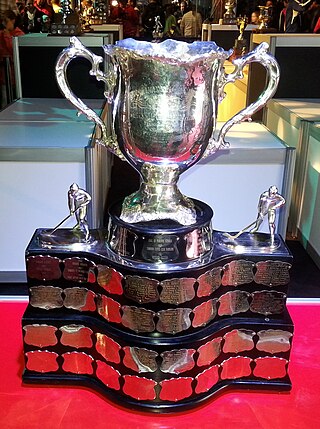
The 1966 Memorial Cup was the 48th annual Memorial Cup competition, organized by the Canadian Amateur Hockey Association (CAHA) to determine the champion of "junior A" ice hockey. The George Richardson Memorial Trophy champions Oshawa Generals of the Ontario Hockey Association in Eastern Canada competed against the Abbott Cup champions Edmonton Oil Kings of the Central Alberta Hockey League in Western Canada. Maple Leaf Gardens in Toronto, Ontario hosted the Final, which featured Bobby Orr, the Generals captain. It was the last of 18 Memorial Cup series to be played at the Gardens. In a best-of-seven series, Edmonton won their second Memorial Cup, defeating Oshawa four games to two. Orr was injured and played sparingly.

The 1964 Memorial Cup final was the 46th junior ice hockey championship of the Canadian Amateur Hockey Association (CAHA). The George Richardson Memorial Trophy champions Toronto Marlboros of the Ontario Hockey Association in Eastern Canada competed against the Abbott Cup champions Edmonton Oil Kings of the Central Alberta Hockey League in Western Canada. In a best-of-seven series, held at Maple Leaf Gardens in Toronto, Ontario, Toronto won their 4th Memorial Cup, defeating Edmonton 4 games to 0.

The 1963 Memorial Cup final was the 45th junior ice hockey championship of the Canadian Amateur Hockey Association (CAHA). The George Richardson Memorial Trophy champions Niagara Falls Flyers of the Ontario Hockey Association in Eastern Canada competed against the Abbott Cup champions Edmonton Oil Kings of the Central Alberta Hockey League in Western Canada. In a best-of-seven series, held at Edmonton Gardens in Edmonton, Alberta. Edmonton won their 1st Memorial Cup, defeating Niagara Falls 4 games to 2.

The 1960 Memorial Cup final was the 42nd junior ice hockey championship of the Canadian Amateur Hockey Association. The George Richardson Memorial Trophy champions St. Catharines Teepees of the Ontario Hockey Association in Eastern Canada competed against the Abbott Cup champions Edmonton Oil Kings of the Central Alberta Hockey League in Western Canada. The same teams played each in the 1954 Memorial Cup final. In a best-of-seven series, held at the Garden City Arena in St. Catharines, Ontario and at Maple Leaf Gardens in Toronto, Ontario, St. Catharines won their 2nd Memorial Cup, defeating Edmonton 4 games to 2.

The 1948 Memorial Cup final was the 30th junior ice hockey championship of the Canadian Amateur Hockey Association (CAHA). The George Richardson Memorial Trophy champions Barrie Flyers of the Ontario Hockey Association in Eastern Canada competed against the Abbott Cup champions Port Arthur West End Bruins of the Thunder Bay Junior Hockey League in Western Canada. In a best-of-seven series, held at Maple Leaf Gardens in Toronto, Ontario, Port Arthur won their 1st Memorial Cup, defeating Barrie 4 games to 0.

Allan Wilfrid Pickard was a Canadian ice hockey administrator, who served as president of the Canadian Amateur Hockey Association (CAHA) from 1947 to 1950. When Canada opted out of the 1947 Ice Hockey World Championships and decided not to participate in the 1948 Winter Olympics, Pickard felt that Canada was obliged to send a team due to its place as a top hockey nation, and nominated the Ottawa RCAF Flyers who won the gold medal for Canada and lived up to the requirements of the Olympic Oath as amateurs. Despite disagreement with the International Olympic Committee, he sought for the International Ice Hockey Federation to adopt the CAHA definition of amateur in the face of increasing difficulty in selecting the Canada men's national ice hockey team.
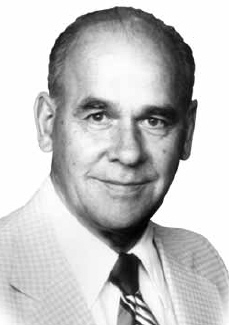
Frederick Page was a Canadian ice hockey administrator and ice hockey referee. He originated from Port Arthur, Ontario, where he played junior ice hockey, refereed locally and later at the Memorial Cup and Allan Cup competitions. He was a league executive in Fort William, then served as president of the Thunder Bay Amateur Hockey Association from 1958 to 1962. He was elected second vice president of the Canadian Amateur Hockey Association (CAHA) in 1962, and rose up the ranks to be its president from 1966 to 1968. Page wanted the CAHA to gain more control over its affairs, and become less dependent on the National Hockey League (NHL). Under his leadership, the NHL ended direct sponsorship of junior hockey teams. He was instrumental in negotiating the revised agreement for the NHL Amateur Draft in 1967, and later served as co-chairman of the resulting joint player development committee.
Jimmy Dunn was hired as commissioner of the Manitoba Junior Hockey League (MJHL) in May 1964. The league had been reduced to four teams based in the Greater Winnipeg area after the withdrawal of the Brandon Wheat Kings and the Fort Frances Royals. The MJHL transitioned from a draft of players in the Greater Winnipeg Minor Hockey Association, into a system where each team chose players from a set geographic district. The new "zoning" arrangement was planned to be in effect for three seasons to stimulate more localized interest in junior hockey and aimed to keep teammates together from the minor hockey level to the junior hockey level. Dunn supported the change and noted that the concept had produced forward lines on previous Memorial Cup championship teams from Winnipeg. The Charlie Gardiner Memorial Trophy series was revived as a preseason tournament for the league's teams. Dunn reached an agreement to televise MJHL games on CJAY-TV, and the league experimented with playing games on Sunday evenings instead of afternoons to increase its attendance and avoid competing with televised football games. Dunn requested to the Canadian Amateur Hockey Association (CAHA) that the MJHL waive its bye into the Abbott Cup finals and its playoffs champion meet the Thunder Bay Junior A Hockey League champion in the first round. He felt that the loss of gate receipts from a bye was a financial hardship for the MJHL, and shorten the league's playoffs to accommodate the change approved by the CAHA.

John Maxwell Roxburgh was a Canadian ice hockey administrator and politician. He organized minor ice hockey in his hometown of Simcoe, Ontario, co-founded the Ontario Juvenile Hockey Association in 1934, and the Ontario Minor Hockey Association in 1940. He served as president of the Ontario Hockey Association from 1950 to 1952, improved its finances to become profitable, and appointed Bill Hanley as a full-time manager to operate the association as a business. Roxburgh served as president of the Canadian Amateur Hockey Association from 1960 to 1962, arranged exhibition games between Canada and the Soviet Union amid an increased rivalry between the respective national teams, and pushed for the separation of politics and sport when the Cold War threatened to cancel the 1962 Ice Hockey World Championships. He was opposed to changes in the Olympic Oath and the international definition of amateurism, and later recommended the formation of a student-athlete team coached by Father David Bauer to become the Canada men's national ice hockey team.
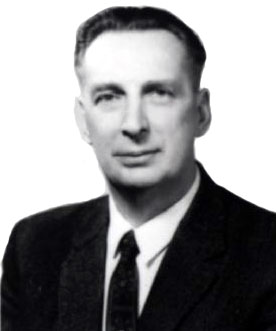
Hanson Taylor Dowell was a Canadian ice hockey administrator and politician. He served as president of the Canadian Amateur Hockey Association from 1945 to 1947, and was the first person from the Maritimes to serve on the national executive. He sought to have the Canadian definition of amateur recognized at the World Championships and the Olympic Games for the benefit of Canada's national team, and negotiated the merger of the International Ice Hockey Association into the Ligue Internationale de Hockey sur Glace. He served as president of the Maritime Amateur Hockey Association from 1936 to 1940, and later as treasurer of the Maritimes and the Nova Scotia Hockey Associations for a combined 30 years.

Sylvester Patrick "Silver" Quilty was a Canadian football player, referee, coach and sport administrator. As a player, he won the Yates Cup in 1907 with the Ottawa Gee-Gees football team, and was credited as the first man to play the flying wing position. He also played with the Ottawa Rough Riders, and the McGill Redmen football team. After his playing career, he became a football referee and officiated the 10th Grey Cup, and also coached the Ottawa Rough Riders.

Lloyd Thompson Pollock was a Canadian ice hockey administrator and businessman. After running the Windsor City Hockey League, he assisted in the foundation of the Windsor Softball League, and later started a junior ice hockey league in Windsor, Ontario. He was a cofounder of the International Hockey League in 1945, and founder of the original Windsor Spitfires junior team in 1946. He served as president of the Ontario Hockey Association (OHA) from 1961 to 1963, welcomed the Montreal Junior Canadiens into the OHA when it was divided by the Metro Junior A League, and supported measures to preserve the Northern Ontario Hockey Association.
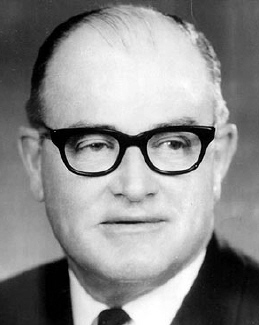
Frank Forest Sargent was a Canadian sports executive in ice hockey and curling. He served as president of the Canadian Amateur Hockey Association (CAHA) from 1942 to 1945, and was president of the Dominion Curling Association (DCA) from 1965 to 1966. He was the first person to be elected to more than two terms as CAHA president, and the first to be president of two national amateur sporting associations in Canada.
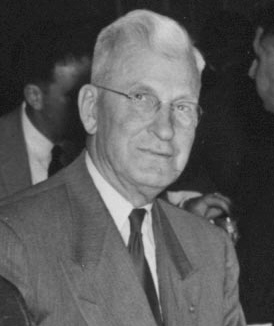
John Welch Hamilton was a Canadian sports executive. He served as president of the Canadian Amateur Hockey Association (CAHA) from 1930 to 1932, president of the Amateur Athletic Union of Canada from 1936 to 1938, and was a member of the Canadian Olympic Committee for 17 years. His leadership of the CAHA and the AAU of C coincided with efforts to maintain amateurism and combat growing professionalism in sport. He appointed a committee to establish better relations between the CAHA and professional leagues, and praised the players and teams for quality hockey and growth of the amateur game in Canada despite the competition. He favoured professionals in one sport playing as amateurs in another, and took charge of the AAU of C at a time when the CAHA, the Canadian Amateur Basketball Association, and the Canadian Amateur Lacrosse Association challenged the definition of amateur, and later broke away from the AAU of C which wanted to hold onto purist ideals of amateurism.
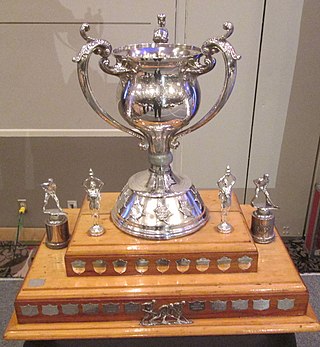
The Saskatchewan Junior Hockey League was a junior ice hockey based in Saskatchewan and Manitoba from 1948 until 1966. It operated under the jurisdiction of the Saskatchewan Amateur Hockey Association. Two of its teams won the Abbott Cup as the junior champions of Western Canada, and the Flin Flon Bombers won the Memorial Cup as the national junior champion of Canada in 1957. Frank Boucher served as commissioner of the league from 1959 to 1966, until the league disbanded when five of its eight teams joined the newly formed Canadian Major Junior Hockey League.
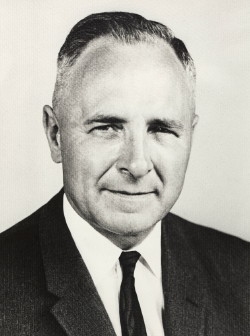
Arthur Thomas Potter was a Canadian ice hockey administrator. He was president of the Canadian Amateur Hockey Association (CAHA) from 1962 to 1964, and oversaw the establishment of a permanent Canada men's national ice hockey team after he decided that sending the reigning Allan Cup champion to international competitions was no longer the answer. He felt that Canada needed discipline to handle Cold War tactics and propaganda at the Ice Hockey World Championships, sought to give its best players to develop as a team, and supported a plan by Father David Bauer to assemble a team of amateur student athletes to complete at the 1964 Winter Olympics.

Lionel Fleury was a Canadian ice hockey administrator who served as president of the Canadian Amateur Hockey Association from 1964 to 1966. Under his leadership, the Canada men's national ice hockey team transitioned from student athletes coached by Father David Bauer into a year-round national team program. Fleury welcomed the Newfoundland Amateur Hockey Association as a new branch member of the national association in 1966, and changed the format of the Memorial Cup playoffs in Eastern Canada from an elimination bracket into a round-robin format to reduce travel costs and address concerns of imbalanced competition. He sought an end to the National Hockey League system of sponsoring amateur teams by replacing it with a draft of players who had graduated from junior ice hockey, and negotiated for a new agreement that was realized after his term as president concluded.
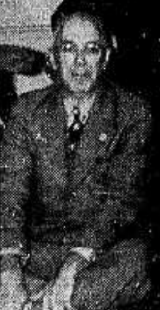
Harry John Sterling was a Canadian ice hockey administrator. He was elected president of the Canadian Amateur Hockey Association (CAHA) in 1920, after serving as an Ontario Hockey Association executive and as president of the Thunder Bay Amateur Hockey Association. He declared that the CAHA would not tolerate the hockey "tourist" after becoming suspicious of players who changed their addresses to be on a new team. His investigation into registrations led to the suspension of a team from Saskatoon when it was discovered that players who won the gold medal representing Canada in ice hockey at the 1920 Summer Olympics were being paid for amateur hockey. His term as president resulted in the CAHA enacting stricter rules for registration and co-operation with the Amateur Athletic Union of Canada to investigate into all Canadian hockey players to maintain amateurism.















